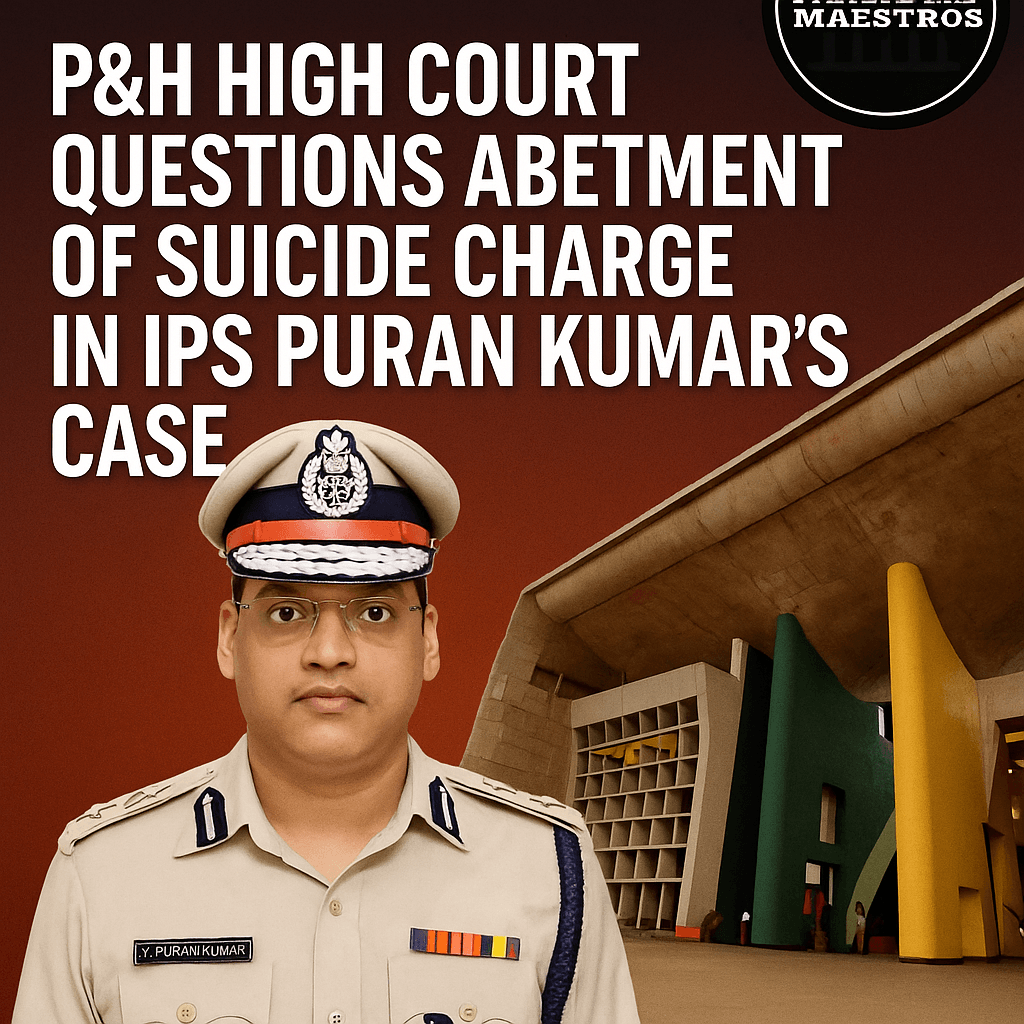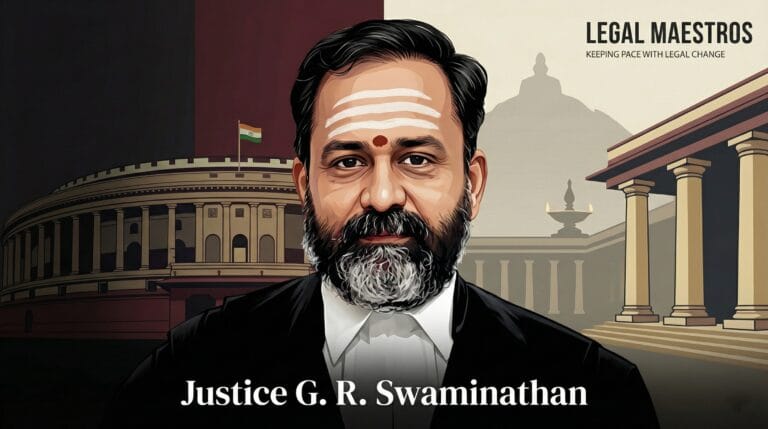
P&H High Court Questions Abetment of Suicide Charge in IPS Puran Kumar' Case
Suicide Abetment Prosecution is Questioning in Court.
The High Court of Punjab and Haryana has cast a serious criminal charge against a senior Indian Police Service officer, Puran Kumar with a critical look. The court is reviewing the case closely which is an abetment of suicide accusation which is being presented. This is a serious offense, stipulated in the third section of the Indian penal code which is the 306 and its punishment is very heavy and it is very harshly penalized by the law. The case has attracted interest since it subjects the conduct of the senior officer to the close scrutiny of the courts.
This was taken to a bench headed by Justice Sumeet Goel. The court is also hearing a plea that was launched by Puran Kumar who is also seeking a legal relief in the case. Rather than just passing through the case, the High Court has taken time to pose a basic question. Just one of the issues that the judge was suspicious of concerns the fact that the presented by the prosecution facts do not really lead to the grave offense of an abetment of suicide.
The whole affair is anchored on the tragic loss of life of a Sub-Inspector Sukhdev Singh who committed suicide. Following the death, it was claimed that the Sub-Inspector was harassed by his superiors which made him commit suicide. This implication was leveled specifically towards IPS officer Puran Kumar who was a senior officer within the district in which the Sub-Inspector was deployed.
For any queries or to publish an article or post or advertisement on our platform, do call at +91 6377460764 or email us at contact@legalmaestros.com.
Intervention by the High Court is aimed at the high legal requirement to establish such a charge. The court has raised serious concerns regarding the case indicating that there is a possibility of misinterpretation of the law by the prosecution. The case bench has stated that not all cases of perceived harassment or work stress could be legally established as abetment. This legal investigation preconditions further analysis of the evidence.
The Core Allegations, the Suicide Note.
The case by prosecution on Puran Kumar is practically based on a suicide note. This was the note that was allegedly found at the scene and was written by Sub-Inspector Sukhdev Singh prior to his death. In the note, the late officer supposedly pointed out Puran Kumar and a few other police officers. He alleged that he was experiencing severe intimidation and pressure in the hands of these superiors.
It is claimed in the note that this is the kind of harassment. It is supposed to have a reference to the official responsibilities of the Sub-Inspector and to an inquiry in his department pending against him. Puran Kumar, as an officer, was presiding over this investigation. This professional examination is allegedly reported to have been unjust and the main cause of his mental stress.
The family of the slain Sub-Inspector has insisted that it was not a mere job pressure that was harassing him. They accuse it of being a focused campaign by the senior officers which resulted directly to the suicide. Depending on the information in this note, the police filed an FIR and Puran Kumar was duly accused of abetment of suicide. The most important evidence used by the prosecution is the note.
But this now is under consideration by the High Court as regards the weight which is given to this note. A dying statement or a suicide note is not considered as an automatic evidence of a crime although it is taken very seriously in the law. The court still has to decide whether the said actions in the note though true were the offense of abetment. The note is an indictment and the allegations contained in it have to be subjected to the rigid legal meaning of the crime.
The Legal meaning of abetment.
The prosecution should meet the rigorous provisions of Section 306 of the Indian Penal Code in order to continue with the case. The legal meaning of the word abetment is what has led to the skepticism of the High Court. According to the law, one commits an abetment of a suicide when he or she knowingly pretends to make the person act, commits a conspiracy with the person to act or merely aids the act.
Justice Goel in his observations concentrated on the first and most prevalent aspect which is instigation. The court is requesting the prosecution to demonstrate that Puran Kumar acted positively. This implies that the officer has to have done or said something, and this is with the apparent intention to provoke the Sub-Inspector to the extent where he had no other alternative but to commit suicide.
This is where the line between the concepts of harassment and instigation is drawn. An officer in a disciplined force such as the police must uphold standards during his or her senior position. This involves making investigations, sending memos or even proposing transfers. Although such acts may seem as harassment to the subordinate, they are usually part and parcel of official work. The statute does not believe such acts to be illegal instigation.
This issue has been determined on several occasions by the Supreme Court of India. The apex court in a number of decisions has said that to establish an abetment charge, the accused should have goaded or incited the individual. The accused should have acted so outrageously that the victim will be in a helpless position. Name calling, disciplinary action or work related reprimands do not suffice to prove an individual guilty under Section 306.
This test of law is being used by the Punjab and Haryana High Court. It is doubting whether the action of overseeing a subordinate even rigidly can be regarded as a positive act of abetment. The court is seeking a piece of evidence that puran Kumar did so with the intent to cause the very particular outcome namely a suicide rather than merely implementing discipline within the police force.
Official Duties vs. Personal Revenge.
The discharge of the official duties is the essence of the argument by the defense that is currently under consideration by the High Court. The lawyers of Puran Kumar will most probably claim that he was only serving his duty. Being a senior IPS officer, he was in charge of the behaviors of his juniors. Bringing an investigation against an officer such as Sukhdev Singh was his job and not a personal attack.








